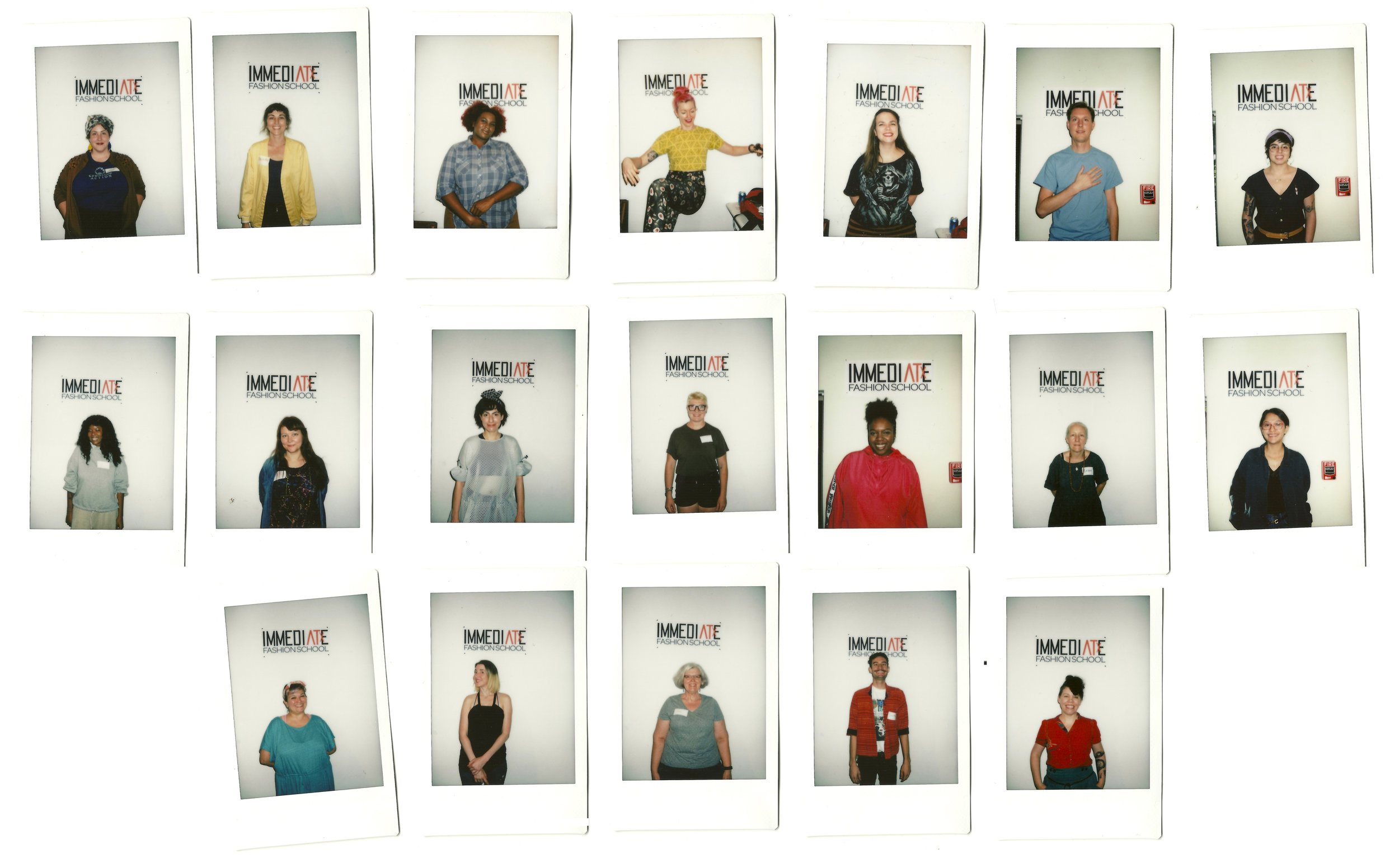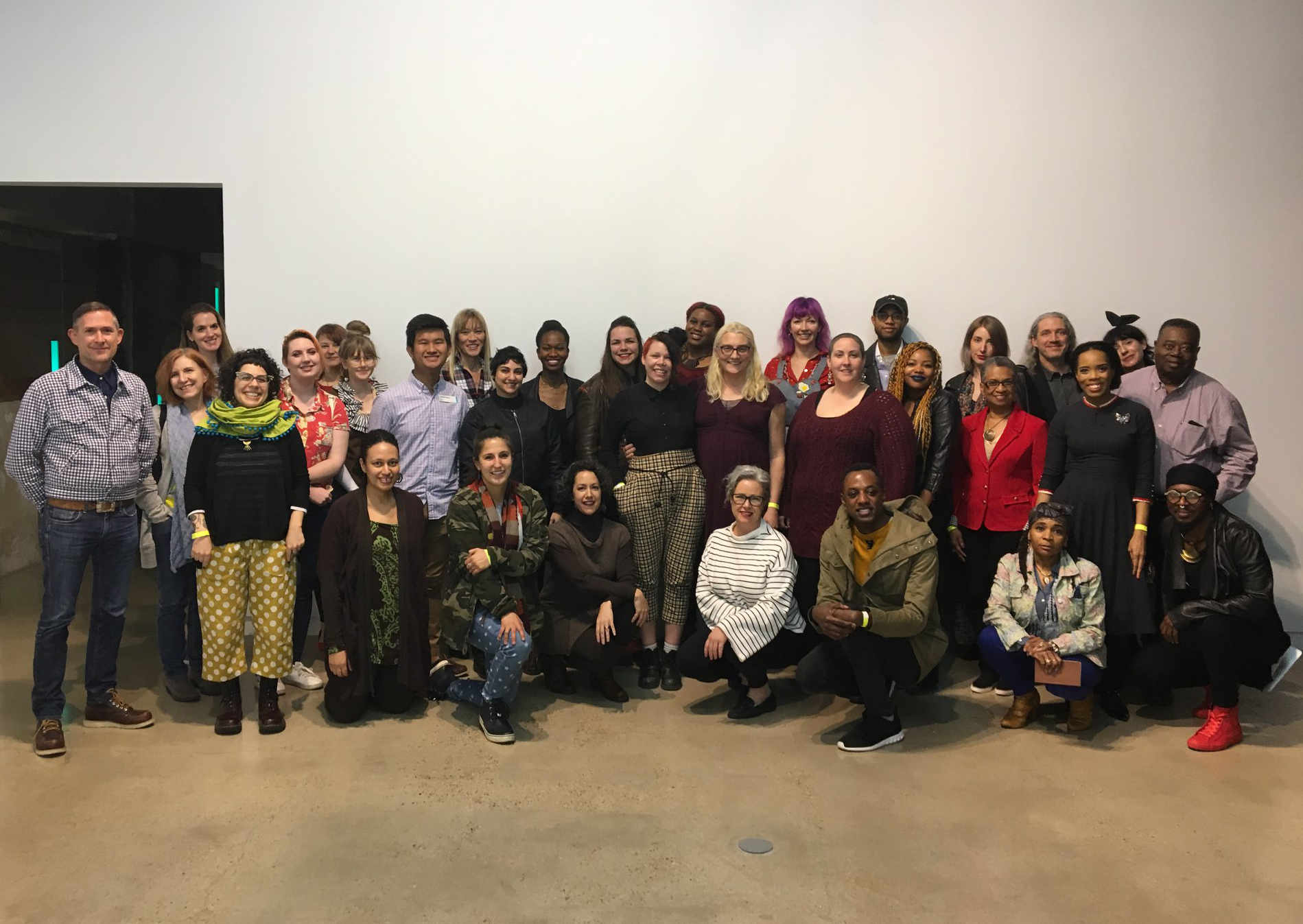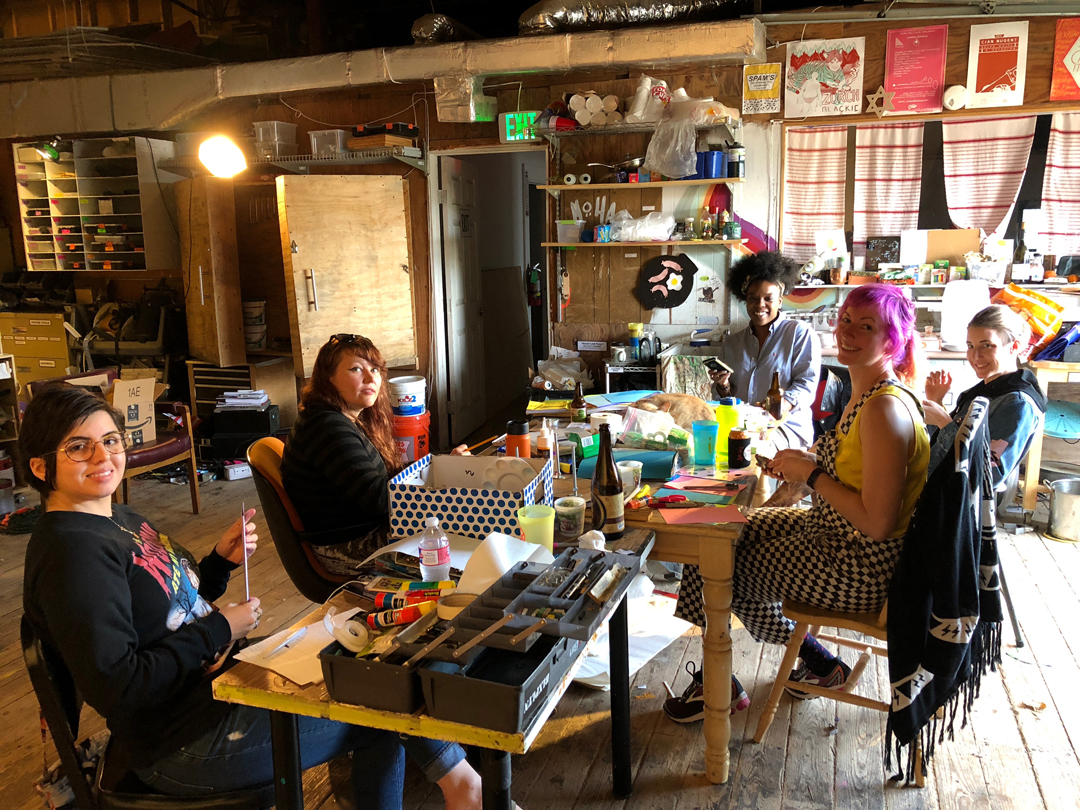Notes from the Field: IMMEDIATE Fashion School
This article is part of a series sharing the results from the inaugural FSJ Research Grant, which supports Master’s students, PhD candidates, early career researchers, and independent researchers working within the fields of fashion design and fashion studies.
IMMEDIATE Fashion School is a rolling collective of artists and creatives working in a variety of media who aim to playfully challenge dominant fashion through study, art and performance. Our work is not a rejection of fashion or the fashion industry per se, but an effort toward knowing fashion as more than just a commodity and ultimately contributing to a more equitable and empowering fashion. The dominant exchanges in fashion are centered around industry and commerce. IMMEDIATE Fashion School strives to give energy & attention to other types of exchanges in fashion — the ones between people.
Our collective was delighted to received a research grant from The Fashion Studies Journal to help support our project. What follows is a report on the first season of IMMEDIATE Fashion School, which spanned October 2017-February 2018 and took place in Austin, Texas.
With a total of 20 members, the collective was made up of musicians, professors, designers, printmakers, curators, performance artists, philosophers, hackers, poets, sculptors, comedians, puppeteers, tarot readers, and many more descriptors of our “whats”. No person was rejected who had interest in participation. Each member contributed monetarily to cover costs like space rental and materials, and options for volunteer hours were provided for those who could not afford to contribute. Most members did not sew or design clothing prior to joining the collective, but all were passionate about fashion and interested in creating new dialogues and experiences surrounding the topic. We came together initially as strangers, but emerged as critical friends.
Throughout the season, we met every Tuesday night to discuss readings in fashion studies. We had a different topic each night — broad subjects like intersectionality, performativity, gender, sexuality, race, technology, communication, appropriation, capitalism, art, etc. Some readings were academically stimulating — Butler, Foucault, hooks, Barthes, Bourdieu, Goffman, Merlau-Ponty and many more; but we didn’t limit ourselves to academic texts. We also looked at literature, pop culture and media references; and everyone was encouraged to add to the syllabus throughout the season. The vibe was accessible and each member of the group was considered both a teacher and a student during these discussions, with each of us taking turns leading the topics.
““We also looked at literature, pop culture and media references; and everyone was encouraged to add to the syllabus throughout the season.””
Part of the thinking behind IMMEDIATE Fashion School is about providing a space where critical ideas can be exchanged among everyday citizens, rather than limiting this type of discourse to academic institutions or circles, embracing the idea of communicating in a co-investigatory way rather than supplying information in an authoritative manner. This latter, traditional method of education was interestingly referred to by critical education theorist Paulo Friere as a “ready to wear” approach to education, which supports the “status quo of oppression” [1]. Indeed, the activities of the collective can be described as a radical pedagogy in alignment with Friere’s concept of “problem-posing education” which supports “action and reflection of men and women upon their world in order to transform it” [2].
In addition to studying and discussing critical theory, the methodology of IMMEDIATE Fashion School is rooted in play and creativity. At the end of each discussion night, we saved time to do playful activities together in order to bring our readings and discussions into contact with our togetherness — everything from Surrealist drawing and writing games to a sex themed game of “Family Feud” to “Vampire Spoons”, a capitalist monster version of the traditional card game, complete with red wine standing in for blood. We focused on the body in our activities with dancing games — one allowed us to practice the art of disagreement while maintaining friendship, and another had us embracing and detecting imitation.
Our play continued outside our discussion nights via skill-share workshops and collaborative art-making sessions. We explored creating our own personal uniforms via weekend long sewing seminars where experienced members stepped up to help teach and walk everyone through all the steps. It was powerful to spend an extended amount of time together and see everyone create a jumpsuit for themselves by the end of the weekend. We also spent a weekend learning an experimental garment cutting technique called subtraction cutting and another weekend exploring screen-printing and stenciling techniques. Sharing these material knowledges with each other was not only inspiring, it also fed directly into our discussions.
An essential component of IMMEDIATE Fashion School is our engagement with scholars, artists and leaders outside our collective on topics relevant to our mission. For our first season we invited Dr. Jonathan Michael Square (Harvard University) and Kimberly M. Jenkins (Pratt Institute & Parsons School of Design) to present their daylong workshop “Fashion & Justice” to our community. We recruited local scholar Dr. Lyndon K. Gill of UT Austin to present as well. The agenda was packed with participatory lectures with titles like “Critical Ways of Seeing,” “A Guide to Conscious Consumption” and “Why Race and Representation Matters in Contemporary Fashion.” The workshop was open to the public and was a truly inspiring day full of collaboration and learning.
Our experiments and improvisations culminated with the output of two collaborative art projects presented at an exhibition at The Museum of Human Achievement. One project was an interactive multi-person garment which took shape as a möbius merry-go-round suspended from the gallery ceiling. During the exhibition, guests were invited to occupy the garment with others and take a ride in the carousel. We used salvaged materials for the project and started out by constructing a 75’ long tube of fabric with black and white fabrics on one side and bright colorful fabrics on the other. The ends of the tube were twisted and stitched together to create a möbius, and then bodices were extracted using the subtraction cutting technique learned in our skill-share workshop.
The möbius is a metaphor we latched onto early in our reading via Fashion and Cultural Studies by Susan Kaiser. To materialize the möbius metaphor, begin with a long strip of fabric or paper with two distinguishing sides - representing a binary condition like masculine vs. feminine, marked vs. unmarked, individual vs. group, mind vs. body, outsider vs. insider, etc. Loop the two ends of the strip together with a twist to create a continuous plane that contains combinations of variants between the former binaries. The möbius metaphor points to the idea that truth is complex and contradictory and thus Kaiser suggests “both/and” thinking rather than binary thinking when sorting through complex topics like fashion [3].
Our other collaborative project was a class zine in which each member of the collective was invited to contribute written or visual material in response to our time together. In the end, our zine was a compilation of creative reflections that took the form of artwork, stories, photography, instructions for a clothing pattern, games, a recipe, a song, a research project and a satirical advice column.
It is common knowledge that dominant fashion fosters inequality, oppression, injustice and ecological irresponsibility. Theorist Peter McLaren talks of a concept called “hegemony” which describes how societies can be “unknowingly” complicit in keeping harmful dominant structures alive [4]. This is related to the idea of perpetuating norms that seem natural, essential or right, when norms are actually social constructions that can be changed, improved, done differently or completely disregarded. Kaiser describes a method of analysis in cultural studies called “articulation” which involves a breaking down and building up of elements [5]. This method of investigation has connections to play’s ability in liminality to break down and re-assemble that which seems normal, natural or unquestioned. Thus, for the first season of IMMEDIATE Fashion School, we played and collectively improvised as we studied and talked in order to not only know fashion deeper, but to try to identify the often invisible and hegemonic norms of fashion and re-articulate them.
Attempting an evaluation of our first season is tricky, as the results are more qualitative and personal than quantitative. For instance, a nurse in our collective found the fashion concepts we studied to have parallels in the medical establishment, and this now impacts her daily work perspective. The quantitative element might come into play with Otto von Busch’s suggestion that fashion activism needs a multitude of self-organized “base communities” or “small scenes and practices” [6]. Therefore, IMMEDIATE Fashion School can be seen as a potential model to be imitated or improved upon by fashion enthusiasts everywhere who are interested in making fashion more equitable and empowering.
IMMEDIATE Fashion School is bringing a micro season to Brooklyn for Fall 2018 and will initiate a second long season in Austin for Spring 2019.
Get involved: www.immediatefashionschool.com
Notes:
[1] Freire, Paulo. 1972. Pedagogy of the Oppressed. New York: Herder and Herder, 76.
[2] Friere, 79.
[3] Kaiser, Susan B. 2012. Fashion and Cultural Studies. London: Berg, 2.
[4] McLaren, P. 2002. Critical pedagogy: A look at the major concepts. In Antonia Darder et al. (Eds.), The Critical Pedagogy Reader. New York and London: Routledge/Falmer, 67.
[5] Kaiser, 6.
[6] von Busch, Otto. 2008. FASHION-able. Hacktivism and Engaged Fashion Design (Doctoral dissertation), 107-193. Retrieved from https://konst.gu.se/english/ArtMonitor/dissertations/otto_von_busch





